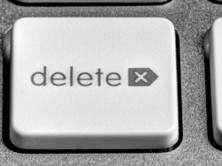Andrew Golis's tweet, pictured above, spurred OJR's Robert Hernandez to blog asking if journalists call sources out for giving faulty information. (Credit: Twitter)
Online Journalism Review’s Robert Hernandez wrote Dec. 8 wondering if journalists have the courage to stand up and call out interviewees for not telling the truth. After all, journalists are supposed to serve as gatekeepers and filters for the public.
Hernandez is an assistant professor at University of Southern California-Annenberg.
He explained that his question was prompted by a tweet from Newsfoo attendee Andrew Golis. Golis, a YahooNews blogger, tweeted:
“Major theme of #NewsFoo today: the new imperative not just to report truth, but attack untruth.”
Newsfoo was an “invitation-only” meeting held in Phoenix earlier this month. As Steve Buttry explained in his Dec. 8 blog on the event, Foo “stands for Friends of O’Reilly. Foo Camps are organized by O’Reilly Media, which collaborated on the planning of this camp with Google and the Knight Foundation.” Newsfoo’s website simply states “technology X journalism.”
Hernandez explained his interest in questioning if journalists challenge their sources:
“We’ve all heard the interviews where we, as the audience, can tell the ‘expert’ is just adding spin. But it feels like it’s only in rare cases where we hear the reporter push back. The notion of truthsquading is very much a part of our journalistic DNA, but lately I’ve been feeling that we haven’t been doing this.”
Hernandez stated that he doesn’t believe that reporters are “calling a lie, a lie enough.” As support for that statement, he wrote ” I feel like the rise of Wikileaks, the popularity of the Daily Show and the reliance of PolitiFact are primarily because we don’t do this enough.”
As StinkyJournalism has reported, ABC’s Sunday morning show This Week brought in PolitiFact this spring to fact-check statements made by guests. A major criticism of the This Week– PolitiFact fact checks has been that the fact-checks aren’t in “real-time,” but rather posted on the Internet the next day.
The move for fact-checking the show in the first place came from NYU journalism professor Jay Rosen. Rosen had noted “the format beckons (guests on Sunday TV news programs) to evade, deny, elide, demagogue and confuse.”
Hernandez posed four questions to journalists in his blog, asking what their thoughts are about questioning what sources claim.
The four questions are :
- “Do you think it is a rarity that a reporter calls a lie, a lie?
- “Outside from being rude, in today’s journalistic landscape, do you think a reporter could call out an expert or source? Why or why not?
- “Should reporters do this more often? Are they already doing it enough?
- “Have you ever been put in that position? What did you do and why?”
He also provided his responses to the questions. Hernandez wrote that he thinks it’s harder for journalists to “call out an expert or source” for many reasons including “job instability” and “fear of losing access,” and being manipulated and given “the run around” by sources.
See Hernandez’s complete post here.
iMediaEthics is writing to Hernandez and will update with any response.
UPDATE: 12/20/2010 2:12 PM EST: iMediaEthics e-mailed Hernandez asking if he thinks the popularity of fact-checking websites and stories makes it easier for journalists to “call a lie, a lie.”
Hernandez responded: “Yes, I think so-ish. I think journalists can point to something like Politifact, and others like it, to say ‘see, they are non-partial and truthsquading’ … but what is odd to me is that it seems a journalist can’t just say that directly without pointing to a ‘neutral’ party. It also seems, well, weak. We need to point to something to call a lie a lie rather than standing up for the truth, it seems.”
He added that he doesn’t have any additional comments right now about the issue, but that he doesn’t think journalists are “doing this enough.”
“We’re not calling a lie [a] lie, and as a commenter put it to me, sometimes we’re not calling a truth, a truth. We’re in a tight spot, when it comes from trust from the ‘audience’ … but we need to do everything possible to restore it,” he wrote.





